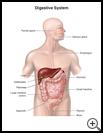
Colon Resection (Colon Removal)
________________________________________________________________________
KEY POINTS
- Colon resection is surgery to remove part or all of the colon (the large intestine), which is part of your digestive system.
- This surgery is done to treat colon cancer, inflammatory bowel disease, or damage to your intestines from a blockage, trauma, bleeding, or an infection.
- Ask your provider how long it will take to recover and how to take care of yourself at home. Make sure you know what symptoms or problems you should watch for and what to do if you have them.
________________________________________________________________________
What is a colon resection?
The colon, also called the large intestine, is part of your digestive system. A colon resection is surgery to remove part or all of the colon.
When is it used?
A colon resection may be done to treat problems such as:
- Colon cancer
- Diverticulitis, which is swelling and irritation of pouches in the lining of your intestines that may get infected
- Damage to your intestines from a blockage, trauma, bleeding, or an infection
- A twisted loop of intestine
- Inflammatory bowel disease, such as Crohn’s disease or ulcerative colitis
A colon resection is usually planned but it may also be done as an emergency procedure.
How do I prepare for this procedure?
- Plan for your care and find someone to give you a ride home after the procedure.
- Follow your healthcare provider's instructions about not smoking before and after the procedure. Smokers may have more breathing problems during the procedure and heal more slowly. It is best to quit 6 to 8 weeks before surgery.
- You may or may not need to take your regular medicines the day of the procedure. Tell your healthcare provider about all medicines and supplements that you take. Some products may increase your risk of side effects. Ask your healthcare provider if you need to avoid taking any medicine or supplements before the procedure.
- Tell your healthcare provider if you have any food, medicine, or other allergies such as latex.
- Depending on why you need a bowel resection, you may be given instructions for clearing bowel movements from your intestines. Be sure to complete the bowel preparation as instructed, including what types of food and drink you can have in the days leading up to the procedure. The surgery may not be done if your intestine still has bowel movement in it.
- Your provider will tell you when to stop eating and drinking before the procedure. This helps to keep you from vomiting during the procedure.
- Follow any other instructions your provider may give you.
- Ask any questions you have before the surgery. You should understand what the healthcare provider is going to do and how long it will take you to recover.
What happens during this procedure?
You will be given a general anesthetic. A general anesthetic will relax your muscles and put you to sleep. It will prevent you from feeling pain during the operation.
Your surgeon will cut out the part of the colon that is damaged or unhealthy. The remaining pieces of the colon are sewn back together. There are two ways this may be done:
- Laparoscopic surgery is done through several small cuts in the belly. A laparoscope is a lighted tube with a camera. Your provider can put the scope and tools into your belly through the small cuts to look inside your belly and remove the diseased part of your colon.
- Open surgery is done with one, larger cut in your belly.
You may also need a colostomy. This means that your healthcare provider will make an opening in your belly and bring the end of the intestine to the outside of your belly. Bowel movements will then leave your body through this new opening. It will be collected in a disposable bag. In most cases the colostomy is temporary. This means that you will have a second surgery to rejoin the ends of intestine to each other, and no longer have an opening in the wall of your belly.
What happens after this procedure?
After surgery, you will be given medicines to help relieve pain. It usually takes 2 to 4 days after surgery for your intestines to start to work again. After you have passed gas or had a bowel movement, you can start drinking liquids, then soft foods.
Most people stay 3 to 7 days in the hospital after the surgery.
Ask your healthcare provider:
- How and when you will get your test results
- How long it will take to recover
- If there are activities you should avoid, including how much weight you can lift and when you can return to your normal activities
- How to take care of yourself at home
- What symptoms or problems you should watch for and what to do if you have them
Make sure you know when you should come back for a checkup. Keep all appointments for provider visits or tests.
What are the risks of this procedure?
Every procedure or treatment has risks. Some possible risks of this procedure include:
- You may have problems with anesthesia.
- You may have infection, bleeding, or blood clots.
- Another part of your body may be injured during the surgery, such as your bladder, the tube that drains urine from your kidney to your bladder, or other parts of your intestines.
Ask your healthcare provider how these risks apply to you. Be sure to discuss any other questions or concerns that you may have.

